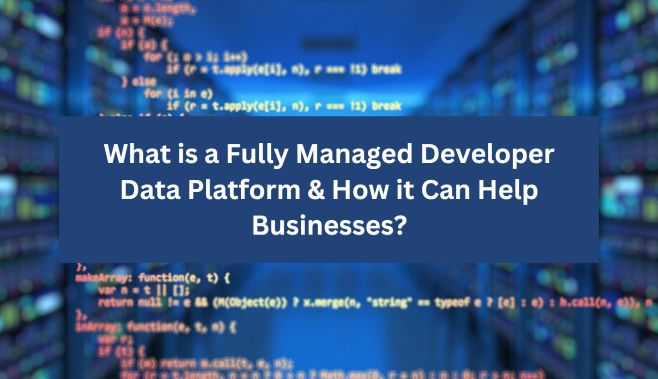As a business owner, making the most out of your data is vital to drive growth and stay competitive. The reality, however, is that managing and utilizing vast amounts of data efficiently can be a daunting task. This is where a fully managed developer data platform (DDP) comes into play. Today, you can learn how a fully managed DDP can empower your business by streamlining data operations, improving collaboration, and building actionable insights.
What is a Fully Managed Developer Data Platform?
To understand a fully managed developer data platform, you must first look at its core functionality as a data platform. SiliconAngle defines data platforms as a tool for building enterprise applications through the effective analysis and implementation of data. This is done with the help of developers who use the platform.
Classifying a developer data platform as fully managed means it is an integrated solution that provides a centralized environment for storing, processing, and analyzing data. The developer data platform provider eliminates the complexities associated with traditional data management. It is achieved through automating tasks such as maintenance, and security. This allows businesses to focus on deriving value from their data rather than dealing with the intricacies of data infrastructure.
Also Read: Overcoming Industry Challenges With Technology Solutions
How Can a Fully Managed Developer Data Platform Help Your Business?
1. Operational Efficiency
A fully managed DDP handles infrastructure provisioning, scaling, and system upkeep automatically. The result is reduced overhead for your IT team, allowing them to concentrate on strategic initiatives rather than routine tasks.
This is especially true for business operations that manage high volumes of historical and real-time data like banking. In another post, here at Aeologic we tackled automation in banking and how it can improve turn-around time in tasks. With a fully managed DDP, your tech team can worry less about data platform maintenance and continue improving processes such as automated workflows.
2. Scalability and Flexibility
As your business grows, so does your data. A fully managed DDP ensures scalability, enabling seamless expansion of data storage and processing capabilities without disrupting ongoing operations. This flexibility is essential for adapting to changing business requirements.
3. Data Integration
Integrating data from diverse sources is often a challenge. A DDP simplifies data integration by providing built-in connectors and tools, facilitating the seamless flow of information across various systems. This results in a more comprehensive and unified view of your business data.
4. Reliable Data Hub
A fully managed DDP serves as a centralized hub for data storage and access. This enables teams across your organization to collaborate more effectively, ensuring that everyone works with the most up-to-date and accurate information. For instance, Aeologic discussed remote developers and how they can contribute to business continuity and growth. To foster better teamwork among your devs, an accessible and reliable DDP is a must-have.
5. Shared Development Environment
Developers can build applications faster with shared tools and streamlined workflows. This is a main focus for big developer data platforms today because working with code is complex by nature. The industry leader MongoDB improved compatibility with as many programming languages as possible so dev teams can work with environments that match their proficiency. This leads to faster development cycles and reduced time-to-market for new products and features.
Learn about New Tech Updates: How Spatial Computing is Changing the Way We Live and Work
6. Robust Security
Security is paramount when dealing with sensitive business data. A DDP provides role-based access control, allowing you to define and enforce permissions based on individual roles and responsibilities. For instance, businesses that try MongoDB can implement advanced data safety features including lightweight directory access protocol (LDAP) and Kerberos access controls, as well as encryption for data at rest. Security measures like these ensure that only authorized personnel can access and modify specific data sets.
7. Advanced Analytics and Machine Learning
A fully managed DDP incorporates advanced analytics and machine learning capabilities, enabling your business to derive actionable insights from large datasets. Predictive analytics and data-driven decision-making become more accessible, which can give you a competitive edge against competitors.
8. Real-time Data Processing
In today’s dynamic business environment, real-time data processing is critical. A fully managed DDP allows for the analysis of data as it is generated, ensuring that your business can respond promptly to emerging trends and capitalize on opportunities swiftly.
9. Data Governance and Compliance
A fully managed DDP includes robust data governance features, ensuring that your data management practices align with regulatory requirements. This not only mitigates risks but also builds trust among your customers and partners.
10. Cost Efficiency and ROI
A fully managed DDP typically operates on a pay-as-you-go model, where you only pay for the resources you use. This eliminates the need for upfront investments in hardware and reduces operational costs, providing a more predictable and cost-effective pricing structure. And with automated resource management, your business can get the most value from your data infrastructure investment.
Also Read: Emerging Technology Solutions That Accelerate Innovation
Final Words
A fully managed developer data platform is a strategic asset for businesses seeking to maximize the potential of data. By streamlining data operations, fostering collaboration, and driving actionable insights, a DDP empowers you to make informed decisions, innovate rapidly, and stay ahead in your industry.









